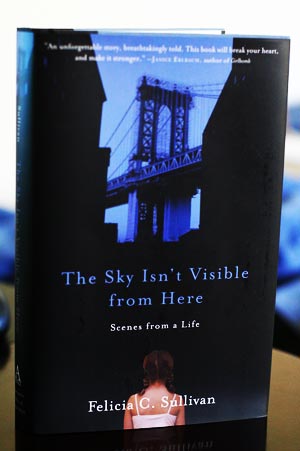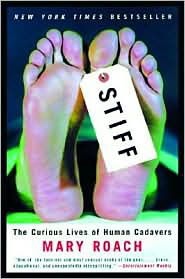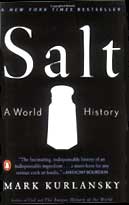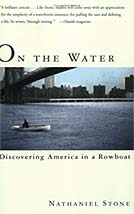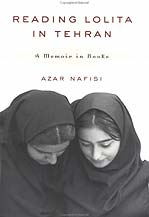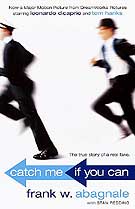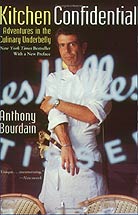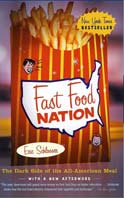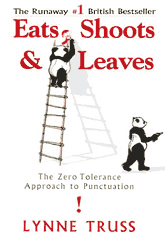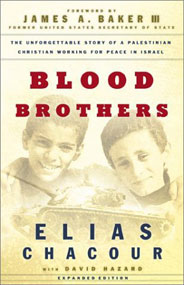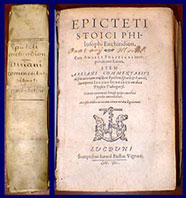Reviews: Non-fiction
February 1, 2009
The Sky Isn't Visible from Here - Felicia Sullivan
I can imagine, that if you worked on Wall St. or in high tech, in some high profile, well-paid job, and your friends summered in the Hamptons and settled in Connecticut suburbs, and you found yourself losing friends, losing your grip, tormented by demons that you couldn't even name, because to you they seemed like nothing compared to the demons you dealt with growing up, I can imagine that like Felicia Sullivan, the author of The Sky Isn't Visible from Here: Scenes from a Life, that you too would be compelled to write, to somehow make sense of it all.
I sat down to read this book one night and couldn't put it down until I finished it at 2 in the morning. No child should have to endure what Felicia grew up with in an environment of neglect, sexual abuse, and drug addiction. We all want our children to be protected, to be surrounded by love and stability. What Felicia survived, was anything but that.
This is a hard book to read, emotionally. Those of us in relatively safe worlds know that people and children exist this way in our own cities, somewhere we know this, in the back of our minds. But most people with lives like this never make it out, and if they do, rarely do they have the skill of writing or gift of narrative to tell such a story to the wider world. That Felicia got herself out, put herself through school, built herself a life, is a testament to her intelligence and will. That she battles with her own pull toward addictive, self-destructive behavior is no surprise, given the broken craziness of her childhood.
I came away from this book sad for all of the children who are growing up this way, who will never get out, sad for Felicia's mother who probably believes she did the best job parenting she could given that her own mother would lock her in a bathroom for days at a time, and in awe of Felicia for the courage it has taken, and still takes, to lead her life.
Links:
FeliciaSullivan.com
Posted by elise at 2:15 PM | Permalink | Email to a friend
August 8, 2008
Stiff: The Curious Lives of Human Cadavers - Mary Roach
Macabre. Gross. Funny, in a twisted, fascinating way. What does happen to our bodies once we are dead and gone? Ashes to ashes and dust to dust, eventually and in most cases, unless you've donated your body to science and then the process is either sped up, as it is dipped in a tub of lye, or delayed indefinitely through plastination. In Stiff: The Curious Lives of Human Cadavers, author Mary Roach takes us on a wild romp through history and science, describing in unsettling detail how cadavers have been used, and are used, in medical research. Although the book is weirdly entertaining, given the subject matter, Roach is always respectful of the bodies, and the people who have donated them.
"The human head is of the same approximate size and weight as a roaster chicken. I have never before had occasion to make the comparison, for never before today have I seen a head in a roasting pan. But here are forty of them, one per pan, resting face-up on what looks to be a small pet-food bowl. The heads are for plastic surgeons, two per head, to practice on. I'm observing a facial anatomy and face-lift refresher course, sponsored by a southern university medical center and led by a half-dozen of America's most sought-after-face-lifters. The heads have been put in roasting pans - which are of the disposable aluminum variety - for the same reason that chickens are put in roasting pans: to catch the drippings. Surgery, even surgery upon the dead, is a tidy, orderly affair."
In the chapter entitled "Crimes of Anatomy", Roach takes us back before the time where there was a legal process in place to donate one's body to science. In the early 1800s teachers of anatomy had to resort to other means of acquiring bodies on which to practice. Body snatching from recently dug graves was the more usual method, and there was a vigorous trade in the practice. The problem was that nobody wanted to be dissected. The common view of life after death was of the whole body making its way to heaven. Dissection was something only done to the bodies of executed mass murderers.
Continue reading "Stiff: The Curious Lives of Human Cadavers - Mary Roach"
Posted by elise at 5:54 PM | Permalink | Email to a friend
May 20, 2006
Salt: A World History - Mark Kurlansky
Who would have thought that something as unassuming as salt could provide the basis for such a fascinating tour through time? In Salt: A World History author Mark Kurlansky gives us a history of the world, from the perspective of the salt trade. Although we take our table salt completely for granted these days, in the not so distant past the ability to access salt was critical for a society's survival. The main use was for preserving food - cod, herring, cabbage, meat. Those countries who had an ample supply of salt could equip armies, live through winters, and engage in the profitable trade of food that would otherwise spoil without salt. Empires have been built, massive fortunes have been made and lost, all to do with controlling the salt trade. Even in nature, where there are salt licks, there are animals, taking in this simple compound so necessary for physical survival.
Kurlansky starts us off in China four thousand years ago where the act of drilling was first invented to access brine from salt wells, and takes us up all the way to the present with the Morton and Cargill companies dominating salt production worldwide. The book is extremely well researched and filled with interesting detail. A must read for any lover of history or of food.
Posted by elise at 7:24 PM | Permalink | Email to a friend
July 6, 2005
Who Are We - Samuel Huntington
If the Mexican Army attempted to infiltrate 1,000,000 soldiers per year into the United States and successfully placed 150,000 of them here, the citizens and Congress of the US would be in a unanimous uproar of outrage. Yet, 150,000 Mexicans, mostly young men, DO successfully enter this country each year. And the Mexican government does, in fact, spend 10s of millions of dollars on programs that encourage them to do so as well as stay here after they arrive.
Who Are We: The Challenges to America's National Identity by Samuel Huntington clearly frames this controversy among several critical issues facing the US. These choices will determine our country's course in dramatic ways over the coming decades and beyond. I can't recommend it strongly enough for any concerned citizen.
Many academics fail to maintain a clean distinction between the descriptive and the prescriptive in their writings, Huntington successfully avoids this classic trap. His point of view on the issues is fairly clear, but he does not let his own views contaminate a crisp analysis of the problems.
Continue reading "Who Are We - Samuel Huntington"
Posted by mvestrich at 4:14 PM | Permalink | Email to a friend
June 23, 2005
Freakonomics - Steven Levitt and Stephen Dubner
In Freakonomics, authors Steven Levitt and Stephen Dubner turn a spotlight on to some touchy areas - abortion, crack dealers, parenting, the KKK, cheating by school teachers, guns in homes. They present a view that if you remove the lens of morality and how things "should be", many phenomena can be explained through basic economic principles. I couldn't agree more. Yet the book is in a word, lightweight. A little over 200 hundred pages and presented in large, easy-to-read print, Freakonomics can be read in a couple of hours. And if you understand anything about economics that you could pick up in a college survey class, you won't be that surprised by their analysis. I can only think that the reason this book has been on the NYT best seller list is because most people don't understand the basic tenets of economics.
Continue reading "Freakonomics - Steven Levitt and Stephen Dubner"
Posted by elise at 8:43 PM | Permalink | Email to a friend
May 30, 2005
On the Water - Nathaniel Stone
On the Water: Discovering America in a Row Boat - In the spring of 1999, Nat Stone set out in a row boat from near the Brooklyn Bridge in Manhattan to row his way around the Eastern half of the United States - up the Hudson through the Erie Canal, down the Alleggheny and then the Mississippi, around Florida, and back up to Brooklyn and up the coast of Maine. The trip was motivated by a lifelong love of the water and boats, and by the need to fulfill a dream of following the route of Howard Blackburn, a nineteenth-century Gloucester fisherman. (Blackburn had lost his fingers after the froze to his oars while he rowed for 5 days straight to come in from the sea in a storm. Blackburn subsequently taught himself how to sail and rigged a boat that took him up the Hudson, down the Mississippi, and around Florida.) Nat's trip included one 9 mile stretch of portage, in which, hooked up to a harness, Nat pulled the boat over land. The trip was also broken up into two parts. The first part took Nat all the way down to the point that the Mississippi empties into the sea, begun in April 1999 and completed in August 1999. To complete the ocean journey Nat would need a boat that wouldn't so easily capsize in ocean swells. He returned to the Bayou in January 2000 and picked up his journey again.
Continue reading "On the Water - Nathaniel Stone"
Posted by elise at 12:34 PM | Permalink | Email to a friend
March 26, 2005
Reading Lolita in Tehran - Azar Nafisi
In Tehran, Iran, for two years during the late 1990s, literature professor Azar Nafisi conducted a secret class in her home for 7 women students. The class was about literature and read from works of Nabokov, Henry James, Fitzgerald, Jane Austin, and others. Reading Lolita in Tehran is professor Nafisi's memoir of those years and those that came before, as Nafisi struggled to teach literature whose very characters and stories more often than not offended the Islamic authorities. Reading Lolita alternates between being a social history of modern Iran and the challenges for women to retain their dignity in a repressive Islamic state, and an inquiry into the power of fiction to open our eyes and give our lives meaning. Nafisi follows the lives of her students - their stories, fears, struggles, and triumphs - as each comes to terms with their lives and roles in the world. Ultimately many, like Nafisi, will choose to leave Iran, rather to continue to live in a culture where so much of their lives are proscribed.
Reading Lolita in Tehran is beautifully written. Anyone who cherishes literature will not only appreciate the subject matter, but the lyrical manner in which it is written. Highly recommended.
Posted by elise at 9:00 AM | Permalink | Email to a friend
March 17, 2005
Catch Me If You Can - Frank Abagnale
Catch Me If You Can by Frank Abagnale is an amazing true story of the adventures of a master con artist and check forger. Of all the books I've "read" from Audible.com, this is among the most enjoyable. In his late teens, Abagnale posed as a PanAm co-pilot, getting lifts on airplanes for free to take him all around the country and the world, allowing him to pass bad checks behind the guise of a respectable airline pilot. By the time he was caught, at age 21, he had managed to bilk his victims, mostly PanAm, of over 2 million dollars. At that was 2 million in the late 60s, when the story took place. Posing as Frank Williams, Robert Conrad, Frank Adams, and Robert Monjo, Abagnale also managed to teach sociology at a college in Utah with a fake diploma, pass the bar exam and work in an attorney general's office, pose as a pediatrician and become a temporary resident supervisor at a hospital in Georgia.
Continue reading "Catch Me If You Can - Frank Abagnale"
Posted by elise at 1:16 PM | Permalink | Email to a friend
December 22, 2004
Kitchen Confidential - Anthony Bourdain
Kitchen Confidential: Adventures in the Culinary Underbelly by Chef Anthony Bourdain tops many a recommended reading list on my favorite food weblogs. So when I noticed it on the book list at Audible.com
, narrated by the author himself, I snatched it up. It does not disappoint. Kitchen Confidential is a rollicking, crude, hysterical, and sobering account of life behind those kitchen doors at the best restaurants in New York City. Bourdain pulls no punches in his storytelling, honestly copping to his early career addictions with drugs and alcohol. Of note is his revelation of why he is not the best chef - that early on he went for the money instead of apprenticing himself at lower pay to the real masters. This book has tips on cooking like a chef - what knives to buy, kitchen equipment really needed, insights on why more restaurants fail than succeed, and presents Bordain's code of values and behavior that will help you succeed should you choose the professional culinary life.
Continue reading "Kitchen Confidential - Anthony Bourdain"
Posted by elise at 11:34 PM | Permalink | Email to a friend
July 26, 2004
Fast Food Nation - Eric Schlosser
So many people had recommended Fast Food Nation by Eric Schlosser that I bought the audiobook on Audible.com and listened to all 9 hours. I have mixed opinions about it. On the one hand Schlosser does a wonderful job describing the history of the fast food industry with terrific case studies of McDonalds and Carl's Jr. Visionary entrepreneurs brought America efficiently prepared meals at prices low enough to make the food affordable to all. Schlosser also expertly delves into the the structure and participants of the entire industry, from the meatpackers and potato farmers to the franchisees and corporate marketeers. The research effort that went into this book are well deserving of praise. I was especially bothered to learn about how in-bed fast-food marketers have become with our public schools, with the schools pimping junk food to students in order to raise revenue. It is shameful that we are trading off the health of our children for the tax dollars that should be going into our schools.
Continue reading "Fast Food Nation - Eric Schlosser"
Posted by elise at 4:19 PM | Permalink | Email to a friend
June 29, 2004
Eats, Shoots and Leaves - Lynne Truss
Note to self: use more semi-colons.
Lynn Truss has written a delightful best-seller on the art of using commas, apostrophes, and semi-colons in her Eats, Shoots & Leaves: The Zero Tolerance Approach to Punctuation. After reading this book all I can think of is that I need to use semi-colons more often. Eats, Shoots & Leaves is both a useful guide to punctuation (primarily from a British perspective) and a witty and humorous rant against the declining use of proper punctuation in our culture. Ms. Truss frequently delves into the historical roots of many of the punctuation and type formatting standards we take for granted today.
How could a book on punctuation make it to the best seller list and stay there for... how many months has it been? One reason is by being well written and entertaining. Another reason is that those of us who read books also often like to write. Since the dawn of email and the Internet we've been writing much more than we would ever have expected to. As such, many of us are on the one hand appalled by the lack of proper punctuation populating the emails of those born around the same time as the personal computer, and on the other hand trying to remember what exactly those rules were that we learned so long ago. Eats, Shoots & Leaves appeals to us for both reasons; Truss lambasts the awful punctuation she sees daily while gently explaining the guidelines for doing it right. (I did it! I used a semi-colon in a sentence!)
Continue reading "Eats, Shoots and Leaves - Lynne Truss"
Posted by elise at 11:08 PM | Permalink | Email to a friend
May 6, 2004
Blood Brothers - Elias Chacour
Elias Chacourt is a Melkite Catholic priest and a Palestinian. Blood Brothers is at once the story of Elias' life growing up by the Sea of Galilee and an impassioned plea for reconciliation between the forces that have torn that area apart during this last century. It is a simple, beautiful, and deeply moving story of one man's work to heal the conflict in his homeland. The title comes from Elias recalling his father inviting Jewish neighbors in for tea when Elias was a young boy, explaining to the children that the Jews and the Palestinians were "Blood Brothers" as they shared the same father Abraham.
What is so striking to me is the absence of a balanced view of the Israeli Palestinian conflict in what we Americans have been told over the last several decades by our government and the press. What most Americans do not know is that in the late 40s the Israeli zionists forced the Palestinians off of the land on which they and their ancestors had lived for hundreds of years, thus setting off the division and conflict that we live with today. No wonder Palestinian militants are blowing themselves up. They want their land back.
Continue reading "Blood Brothers - Elias Chacour"
Posted by elise at 3:30 PM | Permalink | Email to a friend
April 11, 2004
Why Catholics Can't Sing - Thomas Day

When my brother John first told me about Why Catholics Can't Sing, I nearly fell off my chair laughing. Someone had actually written a book about this phenomenon? Every since I started going to church again after a several year absence I have been complaining to all who would listen about the atrocious music sung in Catholic masses these days. It's not that Catholics can't sing, it's that they don't. Who wants to sing unremarkable music? I love to sing and I rarely do in mass. The reason is that most of the music is some 70s holdover sappy pop folk stuff that hurts my ears to hear, especially when accompanied by guitar strummers. Whatever happened to the music I loved as a little girl in the early 60s? Faith of our Fathers, O Santissima, Holy God We Praise Thy Name? When I asked my mother why our music was so bad, especially compared to that of the Episcopalians, she replied that 1) we believe that the music should not detract from the mass, and 2) that great church music sounds too much like Protestant music and we need to be different. Not that she believes either of these reasons to be sufficient justification for bad music, it's just that these are the reasons that are typically given.
Detract from the mass? What is more of a distraction than poorly sung bad music? Try to be different from the Protestants? Why? We have the most beautiful, glorious music in our Catholic heritage and no one is growing up knowing it.
Continue reading "Why Catholics Can't Sing - Thomas Day"
Posted by elise at 10:53 PM | Permalink | Email to a friend
January 6, 2004
The Shadow of the Sun - Ryszard Kapuscinski
My father first introduced me to the works of Ryszard Kapuscinski through The Emperor, Kapuscinski's unnerving examination of Emperor Haile Selassie's rule in Ethiopia told through the eyes of former members of Selassie's court. With The Shadow of the Sun, Kapuscinski spreads his journalist reach throughout the continent of Africa revealing its mosaic of cultures, histories, tribal worldviews and indomitable geography. Kapuscinski is Poland's most renowned journalist. First arriving in Africa in 1957, he lived there off and on for 40 years observing countless coups and managing to contract malaria as well as tuberculosis. Unlike most European visitors who kept to the safe, wealthy areas, Kapuscinski wanted to know how everyday people - tradesmen, bus drivers, medical aides - lived. In this book Kapuscinski describes the centuries old conflict between the Hutus and the Tutsis that resulted in the extraordinary genocide the world observed in the 90s. He writes of the fundamental differences in how people of different African tribes view themselves in relation to the rest of the world, and how these differences often lead to tragedy incomprehensible to the Western mind. Also revealing was the history of the former American slaves who founded Liberia in the early 1800s only to enslave the surrounding local population for the next 100 years.
Continue reading "The Shadow of the Sun - Ryszard Kapuscinski"
Posted by elise at 10:13 PM | Permalink | Email to a friend
December 28, 2003
The Art of Living - Epictetus / Lebell
Happiness and freedom begin with a clear understanding of one principle: Some things are within our control, and some things are not. It is only after you have faced up to this fundamental rule and learned to distinguish between what you can and can't control that inner tranquility and outer effectiveness become possible.
Within our control are our own opinions, aspirations, desires, and the things that repel us. These areas are quite rightly our concern, because they are directly subject to our influence. We always have a choice about the contents and character of our inner lives.
Outside our control, however, are such things as what kind of body we have, whether we're born into wealth or strike it rich, how we are regarded by others, and our status in society. We must remember that those things are externals and are therefore not our concern. Trying to control or to change what we cannot only results in torment.
Continue reading "The Art of Living - Epictetus / Lebell"
Posted by elise at 2:05 PM | Permalink | Email to a friend
June 8, 2003
"Measure of Reality" Alfred W. Crosby
For any of you interested in History of Science and its impact on society, this is a must read.
The Measure of Reality explores another angle of the "Guns, Germs and Steel" line of investigation. Namely, the origins of why did the West, a crude, backwater region; evolve to its significant role in the modern world. Crosby postulates that a shift of Western mindset from qualitative to quantitative thinking, from 1250 - 1600, triggered this power shift.
He provides fascinating detail on many, varied topics such as the development of quantitative music notation (required to perform complex, polyphonic music) and the adoption of double entry bookkeeping. This last required the adoption of “Arabic” numerals before being feasible. Think about a ledger kept in Roman numerals.
Continue reading ""Measure of Reality" Alfred W. Crosby"
Posted by mvestrich at 9:48 PM | Permalink | Email to a friend
